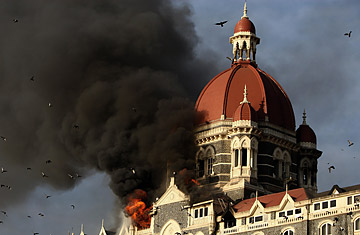
The Taj Mahal Hotel in Mumbai burns on Nov. 27, 2008, during attacks by alleged militant gunmen
Among all the sensational details emerging from the terrorism charges against David Coleman Headley, the American national charged with involvement in last year's terrorist attack in Mumbai, it's easy to miss this one: Headley is alleged to have been working for the Pakistani terrorist group Lashkar-e-Taiba (LeT). For intelligence experts in Washington, however, the LeT connection may be the most sensational allegation of them all — if the charges against Headley hold up, it will mean that the "Army of the Righteous," originally dedicated to neighborhood jihad, is now ready to take on the world.
In charges unsealed on Monday, U.S. prosecutors claim that Headley, who changed his name from Daood Gilani, traveled to Mumbai several times between 2006 and 2008, photographing and videotaping some of the targets that were hit last November in a three-day rampage by 10 LeT gunmen that left 166 people dead. Headley is also accused of carrying out surveillance for a plot to attack the Danish newspaper Jyllands-Posten, which sparked outrage across the Muslim world in 2005 by publishing cartoons mocking the Prophet Muhammad. Upon Headley's arrest at Chicago's O'Hare airport in October, investigators said his luggage contained surveillance videos of the newspaper's office building. (A second Chicago resident, Tawahar Rana, a Canadian national of Pakistani origin, was also arrested in connection with the Danish plot.)
While the Mumbai connection is dominating the headlines, intelligence experts are more alarmed by the Danish plot, believing that it indicates that LeT is no longer confining its targets to India. "There are strong indications that [LeT] is looking to expand its reach beyond its traditional areas of interest," says a U.S. counterterrorism official.
Juan Carlos Zarate, who served as Deputy National Security Adviser on combating terrorism in the Bush Administration, agrees: "[The Headley case] is the manifestation of the concerns Western intelligence agencies have had for some time, of LeT having a global platform."
Unlike al-Qaeda, which was created as a global movement, LeT started out focused on localized nationalist goals. It was formed in the late 1980s as one of several Pakistan-based groups formed to fight the Soviet occupation of Afghanistan. Many of these groups received training and funding from Pakistan's Inter-Services Intelligence (ISI), with the tacit approval of the U.S.
After the Soviets left Afghanistan, LeT in the early 1990s switched its focus to Kashmir, where it served as a convenient proxy for the Pakistani military and intelligence services to wage war on India. LeT fighters initially crossed the Line of Control dividing Kashmir to attack Indian military and civilian targets. By 2000, they were venturing much farther into India, launching terrorist attacks in New Delhi.
Even then, LeT got little attention from Western intelligence agencies. "They were regarded as an exotic novelty," says Bruce Riedel, a former CIA counterterrorism expert now with the Brookings Institution.
The 9/11 attacks forced U.S. agencies to focus on extremist groups in Afghanistan and Pakistan, and after a Dec. 13, 2001, LeT strike on the Indian Parliament, the Bush Administration pressured Pakistan to ban the group. But Pakistani officials did little to stop the group from simply adopting a new name and continuing as before.
In the intervening years, LeT struck in New Delhi, Mumbai and other cities, and Western intelligence agencies began to note the appearance of LeT operatives in Chechnya, Iraq and even Sudan. The group's fundraising activities in North America drew attention in 2006, when two Georgia men (one of Pakistani origin, the other of Bangladeshi origin) were arrested in Toronto for providing material support to terrorist groups, including LeT. The two men are alleged to have been casing potential targets in Washington, including the Capitol and the World Bank. It was clear by then that LeT was "no longer just India's problem," says Zarate, now with the Center for Strategic and International Studies.
LeT's desire to strike at the West was clear in the Mumbai attack, whose targets — two five-star hotels and a Jewish center — were places in which it would be sure to kill many Westerners. Six Americans were among the victims. "Mumbai showed that the LeT has adopted the targets of the global Islamic jihad: 'Crusaders and Zionists,' " says Riedel. The Headley case, he says, shows that LeT is now trying to launch transnational operations.
Stopping them won't be easy. LeT continues to enjoy close association with the ISI wing of the Pakistani military. "Yes, we could target LeT unilaterally, but it would certainly exacerbate tensions with Islamabad further, given that LeT is the most loyal of the jihadi groups to the Pakistani state," says Ashley Tellis, a South Asia expert at the Carnegie Endowment for International Peace.
And attacks on the group by remote-controlled drones or special forces are harder to pull off because LeT's bases and training camps are in Punjab and Pakistan-controlled Kashmir, a long way from the current theater of U.S. covert operations along the Afghan border.
The only realistic weapon the U.S. has against LeT is whatever is left of Washington's leverage over Islamabad. Pakistani authorities, under intense U.S. pressure, arrested several LeT members after the Mumbai attacks and briefly placed movement founder Hafiz Saeed under house arrest. Although a Pakistani court last month indicted seven men in connection with the Mumbai attack, Indian and American officials say Islamabad has done little to shut down LeT.
